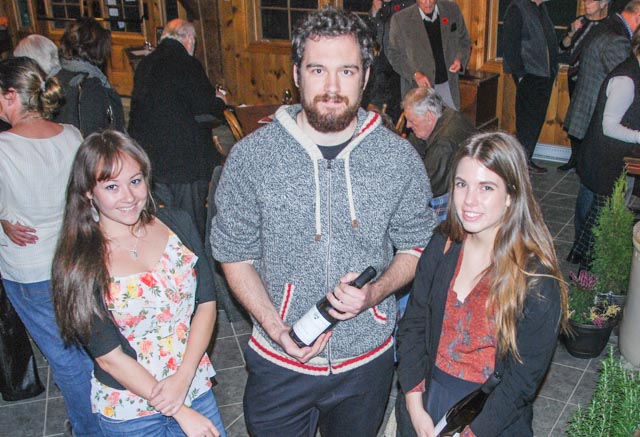
L to R: Osgoode students Sabrina Molinari JD '17, Timon Sisic JD '17 and Amanda Spitzig JD '18 in Prince Edward County (Kathleen Sabyan/Wellington Times)
[Editor's note: This year five Osgoode JD students--Stephen Gray '16, Imelda Lo, Sabrina Molinari '17, Timon Sisic and Amanda Spitzig '18--volunteered their time and energy as part of the Osgoode Public Interest Requirement to help a rural community group prepare an application for judicial review of a wind energy project proposed for idyllic Prince Edward County, Ontario. Promoting renewable energy is an important priority for a more sustainable economy, but it should be pursued in a way that respects local communities, avoids ecological harm and does not reinforce existing social disparities such as that between relatively disadvantaged rural communities and relatively affluent urban majorities. Many Ontario rural residents feel that the government's renewable energy policy is a juggernaut rolling over their needs and concerns. The County Coalition for Safe and Appropriate Green Energy (CCSAGE) was formed by Prince Edward County residents who found themselves in this position. They turned to Osgoode students for help. What follows is these students' collective reflection on their experiences.]
Different natural ecosystems form through the adaptation of their members to one another and their environments. As ecosystems grow they develop particular strengths and sensitivities. Conservation and responsible human development seek to be awake and responsive to these ecological sensitivities.
Much like natural ecosystems, human communities develop and grow with their own emerging strengths and sensitivities and human development must be awake and responsive to these as well.
The Lake Ontario island community, Prince Edward County, is considered a “Creative Rural Economy”, meaning that its economy is largely dependent on tourism, the arts, artisan foods and pension incomes of retirees from urban centers. Its land is not particularly advantageous to efficient industrial use or communications projects and the population has effectively adapted to this fact by developing a vibrant tourism sector that can thrive in the quiet and peace provided by the absence of heavy industry. A great source of pride for the community are the forty or more vineyards that sprawl across the county, taking advantage of its unique soil conditions.
Despite the tranquility and minimal disruption of the natural environment by the human community of this island as being its primary attraction, the Ministry of Environment and Climate Change (MOECC) granted a Renewable Energy Approval (REA) to a wind turbine developer, wpd Canada, to erect 27 turbines across the county in some of its most sensitive ecological areas, most notably, along the south shore.
This area has been designated as an “Important Bird Area” as it is the arrival and departure point of millions of migrating birds, bats and butterflies each year. It is also the home of many endangered species including the Blandings Turtle, Eastern Meadowlark, Bobolink and Eastern Whip-poor-will.
The Ministry of Natural Resources and Forestry granted a “harass and kill” permit in order to construct the turbines.
This allows for an adverse impact to result from a development on the condition that the developers take responsibility for replacing the habitat elsewhere in a way that benefits the species as a whole more than it harms it.
The construction of the wind turbines is not the end of the story however. The energy produced needs to be transmitted to the provincial grid. The Ontario Energy Board (OEB) authorized wpd Canada to construct 28km of transmission lines across the county even though wpd brought their application to the OEB before the MOECC granted clearance that the project would not harm the environment. This created a duplication of hearings for all interested parties, wasting scarce resources, instead of waiting to see the outcome of the application for an REA to see if further hearings and documents would be necessary. This is but one of the many procedural problems, including bias in the Green Energy Act, that undermine the rights of community members.
Aside from the ecological concerns, the artisinal quality and beauty of the landscape on which the county’s economy is structured will be completley displaced as a result of 27 massive turbines obscuring the skyline; not to mention the unforeseeable consequences on the agriculture and plant-life of blasting rock under wetland areas for transmission lines.
Five of us from Osgoode had the unique opportunity to assist the lawyer Alan Whiteley and the group he represents, County Coalition for Safe and Appropriate Green Energy (CCSAGE), in preparation for judicial review of the decisions by these bodies for the approvals they granted.
Much of the case centers around the unfair burdens placed on rural communities by this process and the widely criticized Green Energy Act, especially where community consultation has been minimal and formalistic.
As a result it was very useful for us, steeped in our big-city paradigm, to gain an understanding of the unique needs and concerns of rural communities in concrete terms, both through reading the complaints of real, affected individuals, and going to visit the county to see first-hand the areas and people whose interests we were working to protect.
Projects like this are vital for Osgoode as an institution to ensure that it takes an active role in promoting access to justice in the most practical manner to supplement its academic contributions on the issue.
The importance of reaching out to underserved communities cannot be overstated. On top of the fact that students can provide the work-hours, it isthe best possible way to learn the practice of law. Furthermore, it empowers both the community members and the students to recognize the impact that they are capable of making and that the pursuit of justice is always worthwhile.
Further Links:
Press coverage on student involvement by The Wellington Times
Press update on institutional bias in Green Energy Act

